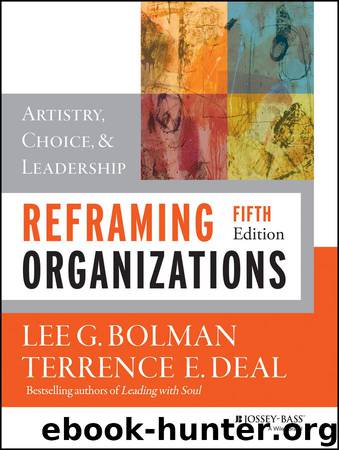Reframing Organizations: Artistry, Choice, and Leadership by Lee G. Bolman & Terrence E. Deal

Author:Lee G. Bolman & Terrence E. Deal
Language: eng
Format: mobi
ISBN: 9781118573310
Publisher: Wiley
Published: 2013-07-15T14:00:00+00:00
As the Agency Is As It Might Become
A maze A well-oiled wheel
Wet noodle Oak tree
Aggregation of competing tribes Symphony orchestra
Three-ring circus Championship team
An unsolvable puzzle A smooth-running machine
Twilight zone Utopia
Herd of rampaging cattle Fleet of ships
Metaphors compress complicated issues into understandable images, influencing our attitudes and actions. A university head who views the institution as a factory leads differently from one who conceives of it as a craft guild, shopping center, or beloved alma mater.
Humor also serves important functions. Hansot (1979) argues that instead of asking why people use humor in organizations, we should ask why people are so serious. Humor plays a number of important roles: it integrates, expresses skepticism, contributes to flexibility and adaptiveness, and lessens status differences. Humor is a classic device for distancing, but it also draws people together. It establishes solidarity and facilitates face saving. Above all, it is a way to illuminate and break frames, indicating that any single definition of a situation is arbitrary.
In most work settings, play and humor are sharply distinguished from work. Play is what people do away from the office. Images of play among managers typically connote aggression, competition, and struggle (“We’ve got to beat them at their own game”; “We dropped the ball on that one”; “We knocked that one out of the park”) rather than relaxation and fun. But if play is viewed as a state of mind (Bateson, 1972; Goffman, 1974), any activity can become playful. Play relaxes rules to explore alternatives, encouraging experimentation, flexibility, and creativity. Playful people at work have created many remarkable innovations. March (1976) suggests some guidelines for encouraging play in organizations: treat goals as hypotheses, intuition as real, hypocrisy as transition, memory as an enemy, and experience as a theory.
Download
This site does not store any files on its server. We only index and link to content provided by other sites. Please contact the content providers to delete copyright contents if any and email us, we'll remove relevant links or contents immediately.
Hit Refresh by Satya Nadella(8854)
The Compound Effect by Darren Hardy(8508)
Change Your Questions, Change Your Life by Marilee Adams(7372)
Nudge - Improving Decisions about Health, Wealth, and Happiness by Thaler Sunstein(7242)
The Black Swan by Nassim Nicholas Taleb(6763)
Deep Work by Cal Newport(6563)
Daring Greatly by Brene Brown(6222)
Rich Dad Poor Dad by Robert T. Kiyosaki(6174)
Principles: Life and Work by Ray Dalio(5961)
Man-made Catastrophes and Risk Information Concealment by Dmitry Chernov & Didier Sornette(5646)
Playing to Win_ How Strategy Really Works by A.G. Lafley & Roger L. Martin(5499)
Digital Minimalism by Cal Newport;(5389)
Big Magic: Creative Living Beyond Fear by Elizabeth Gilbert(5351)
The Myth of the Strong Leader by Archie Brown(5237)
The Slight Edge by Jeff Olson(5200)
Discipline Equals Freedom by Jocko Willink(5157)
The Motivation Myth by Jeff Haden(5003)
Stone's Rules by Roger Stone(4857)
The Laws of Human Nature by Robert Greene(4773)
